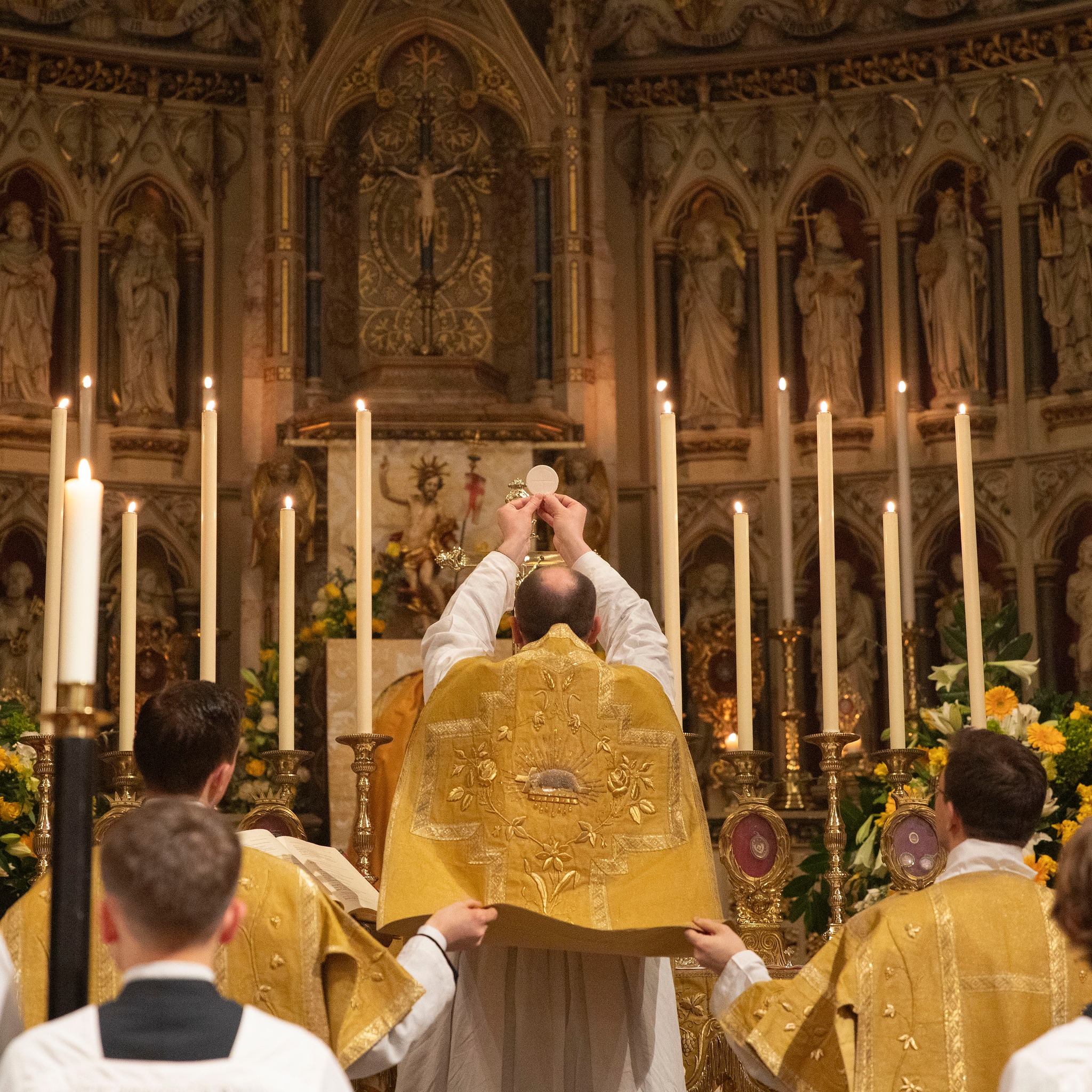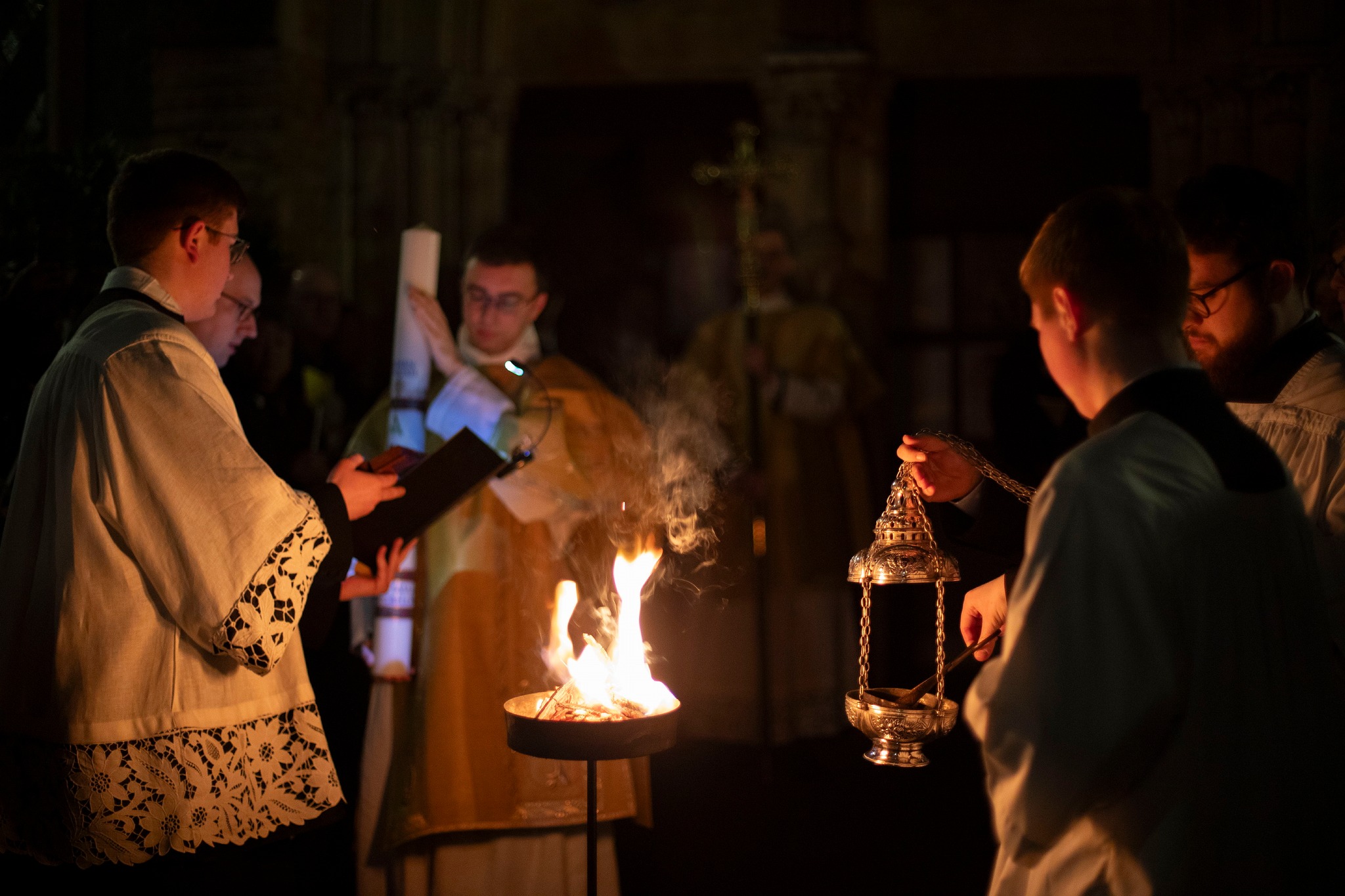
The Eve of Pentecost is a fitting day to be marked out by the Holy Spirit in the sacrament of confirmation. Congratulations to Seth who was received into full Communion with the Church and confirmed today. #oxfordoratory
Funeral arrangements for Fr John Hunwicke
Solemn Requiem Mass on Tuesday 4 June at 11am with a reception afterwards
Burial to follow later in Kennington churchyard
Clergy wishing to attend in choir should e-mail the Provost: contact@oxfordoratory.org.uk
Our Lady at Pentecost
The one time Our Lady is mentioned in the Scriptures after the death of Christ is at the beginning of the Acts of the Apostles. It is the briefest of mentions, but as so often with brief mentions in Scripture, so important.
In Acts 1:14 we read that, after the Ascension of Our Lord, the Apostles were in the Upper Room, “joined in continuous prayer, together with several women, including Mary the mother of Jesus, and with his brothers”. The Apostles and the holy women were afraid: the Jesus they had known they had lost on the Cross — only to have him back with them after the Resurrection — and who then left them again when he ascended to heaven. They were huddled together in the Cenacle, fearful of the Jews, bereft of the presence of Christ, and awaiting the coming of the promised Holy Spirit. No doubt they were somewhat confused as to what exactly this Holy Spirit was supposed to be. And we find Mary at their centre, holding them together so to speak, praying with them — and no doubt for them.
There are a few pious traditions about Our Lord and Our Lady that are not mentioned in scripture, but which are very ancient, and are often depicted in art. One rather touching tradition has Our Lord visiting her immediately after his resurrection: that the first thing Jesus did when he rose from the dead was to go and see his mother. Another traditional belief is that in that Upper Room before the coming of the Spirit, Mary spent her time encouraging the Apostles, moving among them, telling them stories from Christ’s hidden life, praying with them and preparing them for the outpouring of the Holy Spirit. Pope Leo XIII wrote beautifully about this in his encyclical on the Rosary, Adiutricem, when he said:
With wonderful care she nurtured the first Christians by her holy example, her authoritative counsel, her sweet consolation, her fruitful prayers. She was, in very truth, the Mother of the Church, the Teacher and Queen of the Apostles, to whom, besides, she confided no small part of the divine mysteries which she kept in her heart.
Parallels are thus obviously drawn between the cooperation between Mary and the Holy Spirit in bringing about the birth of the Lord, and the cooperation between Mary and the Holy Spirit in bringing about the birth of his Body, the Church. She is not only that human person most filled with the Spirit; she is also the Spouse of the Holy Spirit in the story of our salvation — at the birth of Christ, at the beginning of the Church, and now, today, in the lives of you and me.
All joined in continuous prayer together with Mary.
That is what it meant to be a Christian in those earliest days, the days immediately after the Ascension of the Lord. Waiting on God, together with Mary. Praying to God, together with Mary. Longing for the Holy Spirit to come, but being upheld by the presence of the Mother of God. It is such a perfect image of the Church: all joined in continuous prayer together with Mary the Mother of Jesus. That is still what it means to be a Christian.
May Our Blessed Mother continue to uphold us, encourage us, and prepare us, as we wait for the Holy Spirit — given at Pentecost, poured into our hearts and souls at baptism and confirmation — to mould us and shape us into the children of God, and send us out to preach the Good News to all nations.
These reflections are sent out each Wednesday to all those on our mailing list. Click here to sign up to our mailing list, and receive our Sunday E-newsletter and these reflections straight to your inbox.

Hail, true Body, truly born
of the Virgin Mary mild;
truly offered, wracked and torn,
on the Cross for all defiled;
From whose love-pierced, sacred side
flowed thy true Blood’s saving tide:
Be a foretaste sweet to me
in my death’s great agony,
O my loving, gentle One,
sweetest Jesus, Mary’s Son.
Benediction to conclude our May Devotions in honour of Our Lady.
#oxfordoratory
Life Begins At Forty
Forty is a very significant number. In the Old Testament we read how the rains poured for forty days before the flood came and Noah boarded the ark to await a world renewed by the waters sent from Heaven. Moses fasted for forty days in order to prepare himself to meet God upon Mount Sinai and then spent another forty days atop the mountain to receive the Law from the Almighty. For forty years the people of Israel wandered in the desert before reaching the land promised to them. Elijah walked forty days and forty nights to reach Mount Horeb where he was to know God in the gentle whisper. In the life of Christ there were forty days between his nativity and his presentation in the temple, then the fasting for forty days and forty nights after his baptism, when he was led out into the desert to fast, to pray, and to do battle with Satan in order to prepare for the beginning of his public ministry. This we mirror in our own observance of the forty days of Lent. After his Resurrection from the dead, Our Lord was amongst his followers and friends and seen by all people for forty days before he ascended to Heaven, there to sit at the right hand of the Father.
Forty days, forty years, they all represent the passage of one thing to another — of God perfecting, preparing, changing us anew to make us fit for the next step he has in mind for us in our life with him. We come now, this Thursday, to the culmination of the forty days of Easter with the celebration of the Ascension. The scene of Christ being taken up to Heaven whilst the men of Galilee look on is one that has given rise to beautiful art, music, and those rather fun images and sculptures we sometimes find in churches of a pair of feet seemingly going through the roof. But those feet still bear the wounds of the cross — a reminder that it is the now glorified humanity of Christ that ascends — there to prepare for us the place he has promised us if indeed we are faithful to his commandments.
Life begins at forty we are told, or tell ourselves. The reality is more often, as one of the Fathers says, that just being alive begins to hurt at forty. In the Ascension however the life of the Church really does begin anew at this point, forty days after the Resurrection. The apostles, strengthend, comforted, and renewed by their encounter with the Risen Lord, see him go to prepare that place, and receive from him the Great Commission to preach the Good News and to baptise so that all people might know the Way to the place where on the Ascension he is going.
One might think there is something rather sad about the Ascension — but a parting of friends it is not. With the coming of the Holy Spirit sent by the Father and the Son the presence of God fills the Church and with it the earth. This is expressed in beautiful simplicity by the Penny Catechism:
Where is Jesus Christ?
As God, Jesus Christ is everywhere. As God made man, he is in heaven, and in the Blessed Sacrament of the Altar.
And this is why St Jean Vianney, the holy Curé of Ars, reminded his people that they were much more fortunate than those who lived in the time of Christ: they had to travels hours, days, weeks, to be in the presence of Jesus Christ but all we need to is to go to Church and there to find him in the tabernacle of the altar.
This Ascension we have that opportunity God so often gives us: the opportunity to begin again. To look, for just a moment, up at the Heaven he has won for us and the place that is there waiting for us. Then encouraged by this to go and preach the Good News in our own place, to win others to Christ by our efforts to love and to co-operate with all that Heaven sends us. The Ascension points us to Heaven and thus to the End — of Christ’s earthly ministry and where we hope to be when our life ends, but it is a beginning too. Our Cardinal, St John Henry Newman, wrote “Fear not that life shall come to an end, but rather fear that it shall never have a beginning”. Forty days after the Resurrection we begin again. We embark upon the ancient but ever new task that Christ places before us. May this Ascension be the proof for us that life really can begin at forty.
These reflections are sent out each Wednesday to all those on our mailing list. Click here to sign up to our mailing list, and receive our Sunday E-newsletter and these reflections straight to your inbox.

Today is the feast of the English Martyrs. We placed on the altar for Mass today our set of four reliquaries containing the relics of Edmund Campion, Oliver Plunkett, Henry Garnett, Robert Southwell, Henry Walpole, Edward Oldcorne, John Southworth, Thomas Whitbread, Thomas Garnett and Thomas More.
Faith of our fathers, living still
In spite of dungeon, fire, and sword:
Oh how our hearts beat high with joy
Whene’er we hear that glorious word!
Faith of our fathers! Holy Faith!
We will be true to thee till death.
#oxfordoratory
May Music
Sunday 5 May Solemn Mass 11:00
6th Sunday of Easter
Missa Ave virgo sanctissima Esquivel
Benedicite gentes Palestrina
Regina caeli Victoria
Magnificat Primi Toni BuxWV203 Buxtehude
Thursday 9 May Solemn Mass 18:00
The Ascension of the Lord
Missa Jam Christus astra ascenderat Palestrina
Ascendens Christus in altum Victoria
Ascendit Deus Philips
Postlude in D Minor Stanford
Sunday 12 May Solemn Mass 11:00
7th Sunday of Easter
Mass for five voices Byrd
Viri Galilaei Palestrina
Non vos relinquam orphanos Byrd
Pièce d'orgue BWV 572 Bach
Sunday 19 May Solemn Mass 11:00
Pentecost
Missa Dum complerentur Victoria
Loquebantur variis linguis Tallis
Dum complerentur Palestrina
Choral varié sur le Veni Creator Duruflé
Sunday 26 May Solemn Mass 11:00
The Most Holy Trinity
Missa brevis in C, KV 220 ‘Spatzen-Messe’ Mozart
Tibi laus, tibi gloria Philips
Ave verum Mozart
Clarifica me, Pater III, BK49 Byrd
Monday 27 May Solemn Vespers 18:30
Our Holy Father St Philip Neri
Deus in adjutorium Croce
Magnificat primi toni Palestrina
Pangamus Nerio Sewell
O salutaris hostia Laloux
Tantum ergo Widor
Adoremus Laloux
Respice de caelo Sewell
Tuesday 28 May Solemn Mass 18:00
Our Holy Father St Philip Neri
Ecce sacerdos magnus Bruckner
Missa Papae Marcelli Palestrina
In spiritu humilitatis Croce
Laudate dominum a8 Palestrina

Please pray for the repose of the soul of Fr John Hunwicke, who died on Tuesday.
Fr Hunwicke has been a friend of our community and a familiar face to our congregation for many years. He was ordained priest in our church in 2012 for the Ordinariate of Our Lady of Walsingham. More recently he tutored many of the Fathers in Latin and was a regular guest speaker at our Lenten talks. He will be greatly missed.
His funeral will will take place in our church. Full details will follow once they have been confirmed.
Grant, we pray, O Lord, that the soul of John, your servant and Priest, whom you honoured with sacred office while he lived in this world, may exult for ever in the glorious home of heaven. Through our Lord Jesus Christ, your Son, who lives and reigns with you in the unity of the Holy Spirit, God, for ever and ever. Amen.
#oxfordoratory
Easter goes on
“It is at this time of year,” the remark came, “when one is a bit fed up with Easter Hymns. There are no good ones left and it is too early for May hymns to Our Lady.” Whilst clergy can find the oddest things to complain about, there is both something with which to have sympathy in this view and also something to rebel against. As we head into the last week before the Ascension we can marvel that Easter still goes on, whether we have sung all the good hymns or not. But that is rather the point: Easter does go on and on and it is something about which we do not give enough thought.
At the moment of the incarnation, our Lord took our human nature to himself but also shared his divine nature with us. And as he went through his life experiencing all that it is to be human, he shared with us his divinity. Just as death is an ever present reality in everyone’s lives, every day, so too the resurrection is an ever present reality in the lives of believers. If the human experience is coloured by the presence of death, that colour is changed by the fact that the life of the Risen Christ colours it too.
Caryll Houselander once reflected on this presence. She wrote:
All day long, all over the world there is resurrection. A puny infant is baptized; Christ lives again, strong in his new life. A convert is received into the Church, a little appalled and disappointed by the sense of emptiness in his own soul, after the long tension of his conversion; Christ comes back to the world. A boy murmurs the monotonous story of his sins in the cramped confession box, the words of absolution are spoken; Christ lives again in the heart of mankind. A forgotten old woman dies in the workhouse. To those who close the eyes and cover the quiet face nothing extraordinary has happened; in the eyes of the Eternal Father, Christ has risen again from the dead. Every day thousands of people receive Holy Communion. Christ who has been sacrificed on the altar is laid in the tomb of their hearts. There is no place he will not come: prisons, hospitals, schools, camps, ships at sea, cathedrals, little tin churches; he comes to them all. He comes into the houses of the sick and the dying, regardless of whether they are mansions or slums.
When we receive the sacraments, we too must be conscious that Christ is ever rising in our hearts. We are joined on to him, and so those moments of grace, of renewal and of devotion are participations in his resurrection. We have to make sure we look for them and keep them. Easter characterises and defines the life of our soul as much as anything else. If we only kept that in mind more we could still be found singing, “Christ the Lord is risen today” with as much freshness and gusto in July as on Easter morning, because the truth is that it is always Easter morning somewhere.
So the Ascension is not the end, because there is no end. We are in Easter now, and we always will be. And we must thank God for that.
These reflections are sent out each Wednesday to all those on our mailing list. Click here to sign up to our mailing list, and receive our Sunday E-newsletter and these reflections straight to your inbox.
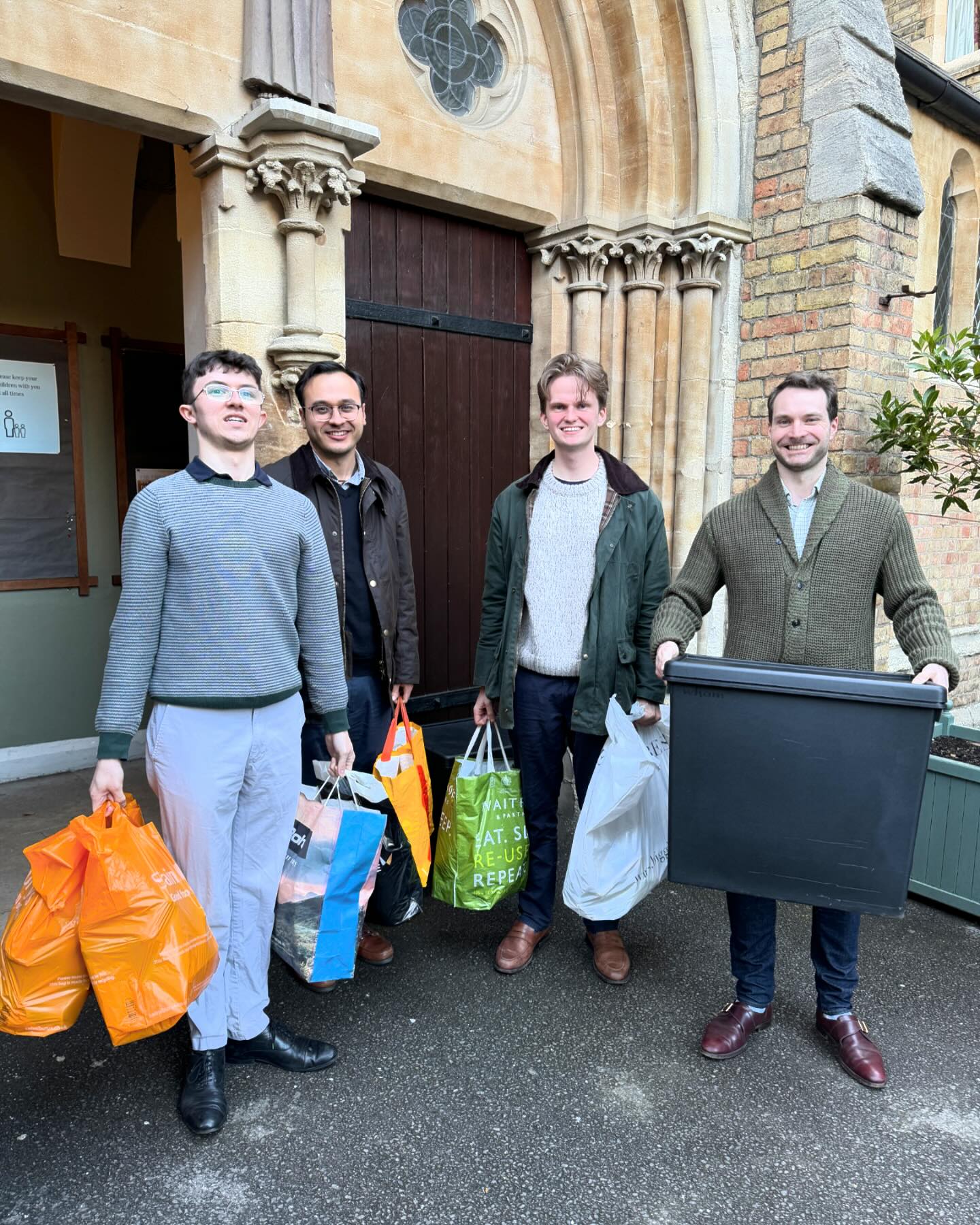
We had a great response to our collection of food for the Oxford Food Hub this weekend. Thanks to all the Oratory Outreach volunteers who made it possible. The next collection will be after Masses on the last weekend in May. #oxfordoratory
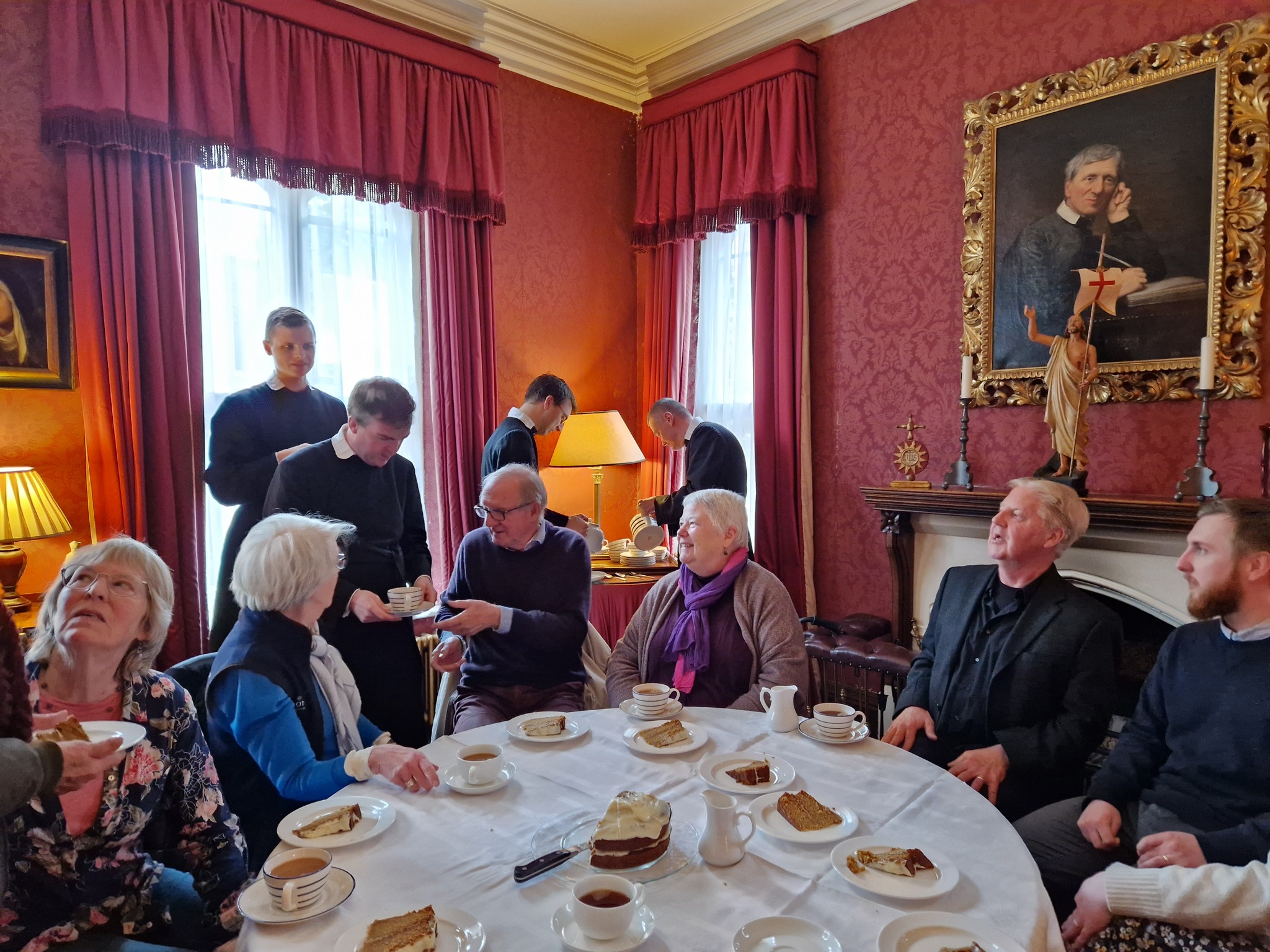
Today is the Patronage of St Philip, the birthday of the Oxford Oratory. Three new members were enrolled in the Secular Oratory. Then we celebrated with cake.
#oxfordoratory
The Patronage of Saint Philip Neri
This Saturday we commemorate St Philip’s Patronage of this very Oratory. It is not just a ceremonial observance, but a profound recognition of the influence and care of our beloved Holy Father over the lives of the Fathers of the Oratory and the souls they shepherd.
Saints are set apart for a sacred office of dedication to God’s service. St Philip is entrusted with the continuous care of the souls here as the patron of the Congregation of the Oratory. On this feast, then, we are reminded of his gentle role as our Holy Father, and the special place he holds in our lives. He is our protector and advocate. He is our intercessor, speaking on our behalf to the Lord. He is someone who guides us now as once he guided the people of Renaissance Rome.
It might have been the Saint’s exceeding joy, humour and approachability that initially attracted the attention of the people of his city, but it was certainly his deep faith and love for our Lord that inspired people to love our God as St Philip loved him. It is this same deep faith and love that makes him our spiritual father, always willing to intercede for us.
But the idea of patronage also encompasses inspiration. St Philip’s commitment to Rome is the perfect example of the commitment of this Congregation to the people of Oxford. The Oratory Fathers strive to emulate the joyful disposition and humour of St Philip, aiming always to approach the love of God with a light heart and spreading that same joy and example of sanctity to others. This sanctity of St Philip is not one only characterised by miracles or his Counter-Reformation work to keep our Catholic faith alive. It is firstly characterised by our patron’s genuine humanity and humility. By being available, approachable and interested in human nature, St Philip transformed ordinary encounters into moments of spiritual joy and closeness to God.
We should invite him to guide us with his love away from sin and temptation; to be not only the patron of our Oratory, but of our whole lives, unreservedly; to be the one we seek for aid; to be the one who guides us to eternal bliss.
As we celebrate the feast of the Patronage of St Philip, let us recommit ourselves to living out his virtues, especially of joy, humility, and love. May his intercession continue to guide us to Heaven as he inspires us on Earth. And may his Oratory remain a beacon of faith, fellowship, and service to all, as St Philip intended.
These reflections are sent out each Wednesday to all those on our mailing list. Click here to sign up to our mailing list, and receive our Sunday E-newsletter and these reflections straight to your inbox.
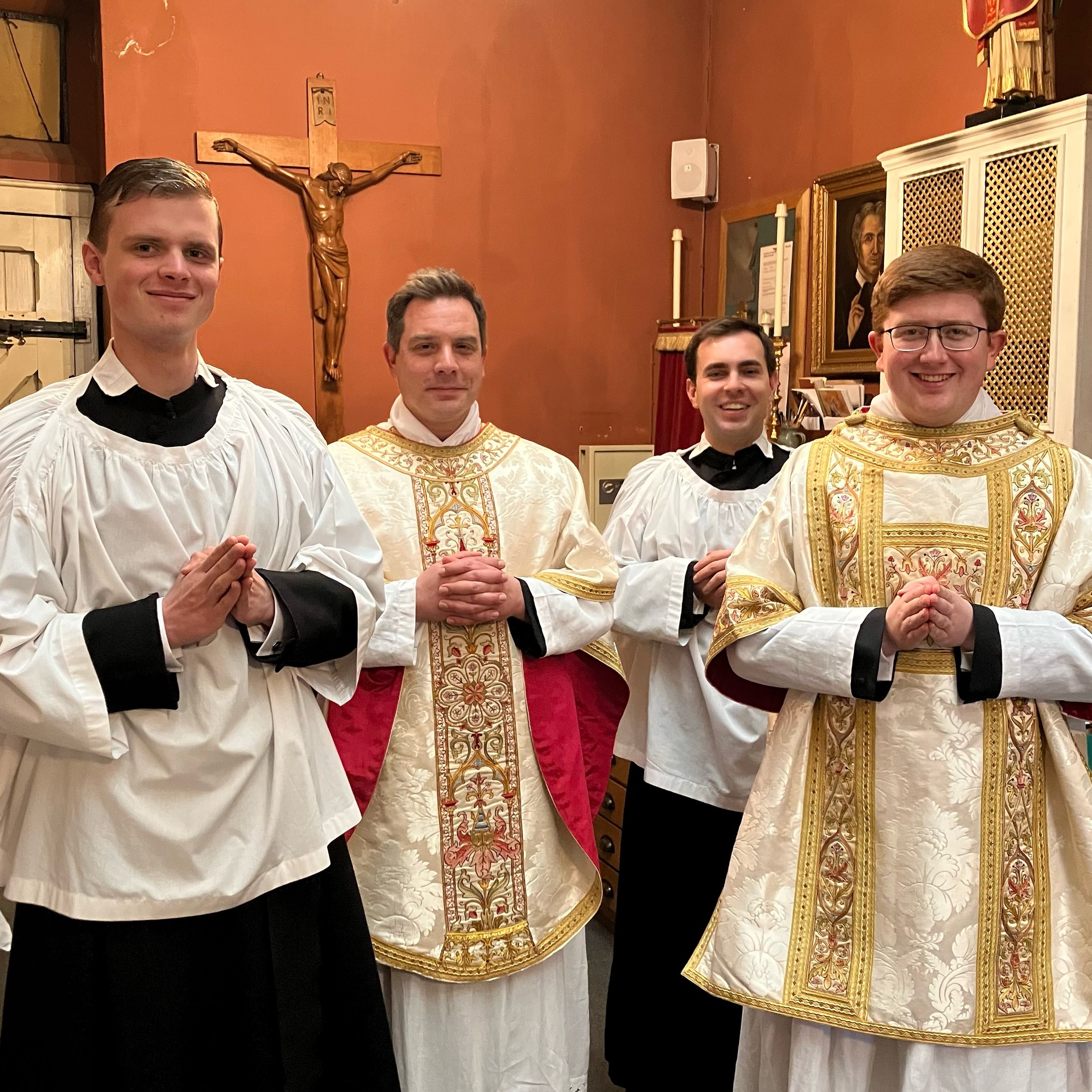
On Good Shepherd Sunday, we pray for more vocations to the priesthood. Please pray as well for the priests we already have and the ones who are on their way!
#oxfordoratory
Favourite resurrection stories
The Gospel writers include a mix of events that took place after Christ’s resurrection. The accounts of what exactly happened when the tomb was first found empty all capture the same events from a different angle — whether that is of the women who found the tomb empty, of Mary Magdalene, or of the apostles. It may be that each Gospel writer wanted to include something that the others had not. Or that there are significant spiritual truths being conveyed in these different emphases. Or, perhaps, that each writer simply included his own favourite accounts of what happened next.
St John more or less says this himself when he seems to conclude his Gospel with the words: “there are also many other things which Jesus did; were every one of them to be written, I suppose that the world itself could not contain the books that would be written.” (John 21:25) Christ continued to appear to his disciples for forty days — we only have partial accounts of four of these days in the Gospels. There probably was too much to write down. But then John goes on to write another chapter, where he includes just one more resurrection appearance that he couldn’t leave out. Perhaps this was his favourite story — we can certainly understand if it was.
Seven of the disciples, including Peter and John, go fishing. They work all night and catch nothing. Then a mysterious figure appears on the shore and tells them to try again on the right side of the boat and they’ll catch something. And they find more fish than they can haul in.
They’ve been here before, of course. Jesus did this when he first met them (Luke 5). And it makes John realise: “It is the Lord!”
When they get to land, they find Jesus waiting with a charcoal fire with bread and fish ready, and he invites them to bring some of the fish they have just caught and join him for breakfast.
There are many important things that take place here, like Peter’s reconciliation, and Our Lord’s prophecies of what will happen to Peter and John. There is a powerful image of the Church in the net full of fish that does not break. But what I find most interesting are the questions this passage raises in passing without any attempt at answering them.
For a start, where did Jesus get his bread and fish and fire from? When the disciples come ashore, it’s clear that there is plenty of bread and fish on a fire already, and the disciples add to that fish. Jesus has a “here’s one I made earlier” moment. But did he? Did he say: I’m God, so let there be a fire, let there be bread and fish, and there were? Did he command his angels to light a fire and provide these things? Or — and this is the option I like best — did he do it himself? No one says that we can’t take pleasure in fishing or lighting fires once we’ve risen from the dead.
As much fun as it is to picture the angels busying themselves with fishing rods and kindling, I suspect that’s not what happened. We can’t be sure of course. Each option is possible. But that still tells us something. It tells us that it is possible that Our Lord, risen from the dead, could have chosen to do these things for himself, if he wanted to. We know he continued to interact with the physical world — as we see when he eats breakfast. There is something quite moving in the idea that all those everyday tasks that go with being human are not beneath the risen Lord, and that he might even have done them by choice.
It takes John only a few sentences to describe the disciples’ work and journey back to shore. It won’t have been instantaneous. Jesus was waiting on the shore for a long time. What was he doing during that time? He wasn’t teaching anyone. He wasn’t healing anyone. He wasn’t sleeping.
Was he praying? Maybe. Earlier in the Gospels, whenever he has time to himself, he uses it for prayer, to be alone with his heavenly Father. But those intense periods of prayer he set aside before were for working out the details of his mission. Now that his mission is more or less complete, I don’t think he needed to pray in quite the same way. So what is he doing?
Perhaps he just sat there, enjoying the sun rise across the lake and lighting up the hills on the other side. (I’ve never been to the Holy Land, but a quick image search suggests it’s a stunning view.) And so I like to think that Our Lord simply took pleasure in the beauty of the world he created. He looked at it all and saw that it was good, as he had done once before. And he did so, sitting on the beach, next to a fire, listening to the sound of the waves, and waiting for his friends to join him.
Christ is risen from the dead, but he hasn’t lost any of his humanity that he shares with us. We look forward to sharing in the joys of heaven with him one day. But he already takes pleasure in sharing our joys now.
These reflections are sent out each Wednesday to all those on our mailing list. Click here to sign up to our mailing list, and receive our Sunday E-newsletter and these reflections straight to your inbox.
“Always go forward; never look back.”
The Franciscan missionary, St Juniper Serra, the “man who founded California”, was known to say “Always go forward; never look back.” While it is undoubtedly a good piece of advice for those embarking on the missionary enterprise, it should suffice for us too, who are living the life of faith in Christ. We too are on a journey, and the greatest enemy to our progress is a tendency to turn back to what was, to look to our past, and most especially, our sins.
We should never look at any sin in our past life — especially since it has been confessed and forgiven — except in a way that leads us to give thanks and praise to God, “whose mercy endures forever!” St Augustine, and later St Thérèse, held that Grace is everything. We have so much for which to give thanks to God, so much for which, like our Lady, to “magnify him”. This means, to make much of him. This is what the Saints do: they give thanks to the Lord for his mercy and grace, without looking back, propelled onward by joy. If you look back at your past and are depressed by what you see, do what St Paul did. First, he acknowledged “I was a blasphemer”, but he didn’t dwell on that. He didn’t say how unworthy he was to be a follower of Christ, let alone an apostle. In fact he says: “I thank Christ Jesus our Lord who has enabled me, for he counted me faithful, appointing me to his service.” (I Tim. 1:12) When St Paul looked at his past and saw his sin he did not hide away saying, “Woe is me, I’ve done such terrible things, I’m unfit to be a Christian.” Not at all. The effect was to cause Paul to give praise to God. He gloried in Christ’s grace saying, “and the grace of our Lord abounded exceedingly with faith and love which is in Christ Jesus.” (1 Tim. 1:14) This is something, an attitude, we can copy. If we look at our past and feel depressed, it means that Satan has scored a victory over us, causing us to doubt God’s mercy, and therefore his love, and to focus on ourselves, which is never a good idea. By all means be sorry but don’t be sad, since Grace was more abundant. Padre Pio once reminded a penitent that “God’s mercy is infinitely greater than your malice.”
We are still celebrating the Lord’s triumph over sin and death in his glorious Resurrection, which, because we have been called to share in that Risen Life, gives us real joy. The past then is dead, and through the grace of Baptism, we are now one with Christ, our sins having been blotted out once and forever. He walks with us, guiding and leading us on the way, which is why we should heed St Juniper’s words: “Always go forward; never look back.”
These reflections are sent out each Wednesday to all those on our mailing list. Click here to sign up to our mailing list, and receive our Sunday E-newsletter and these reflections straight to your inbox.
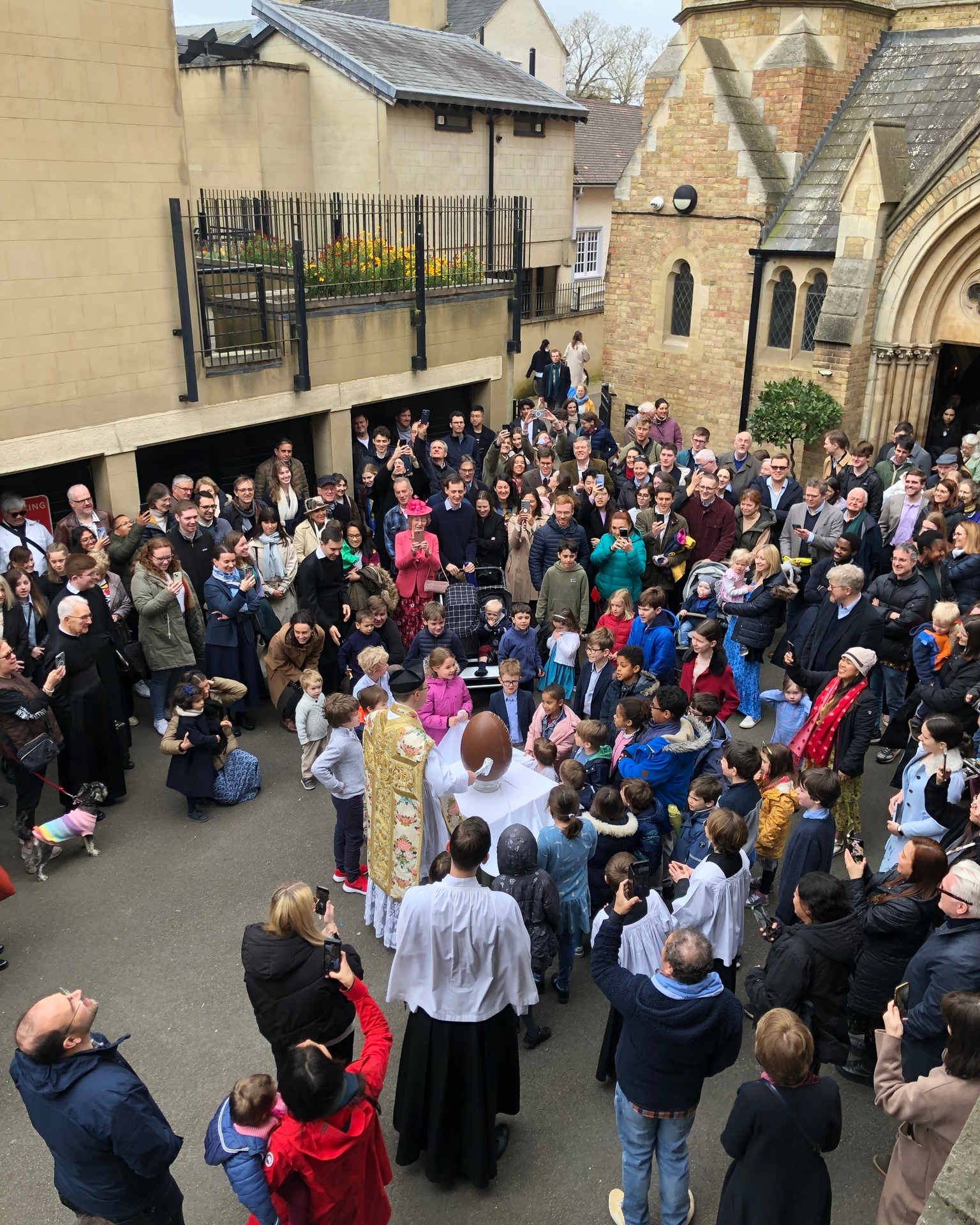
Great crowds joined us for the smashing of the Easter egg after the 9:30 Mass on Easter Sunday.
#oxfordoratory
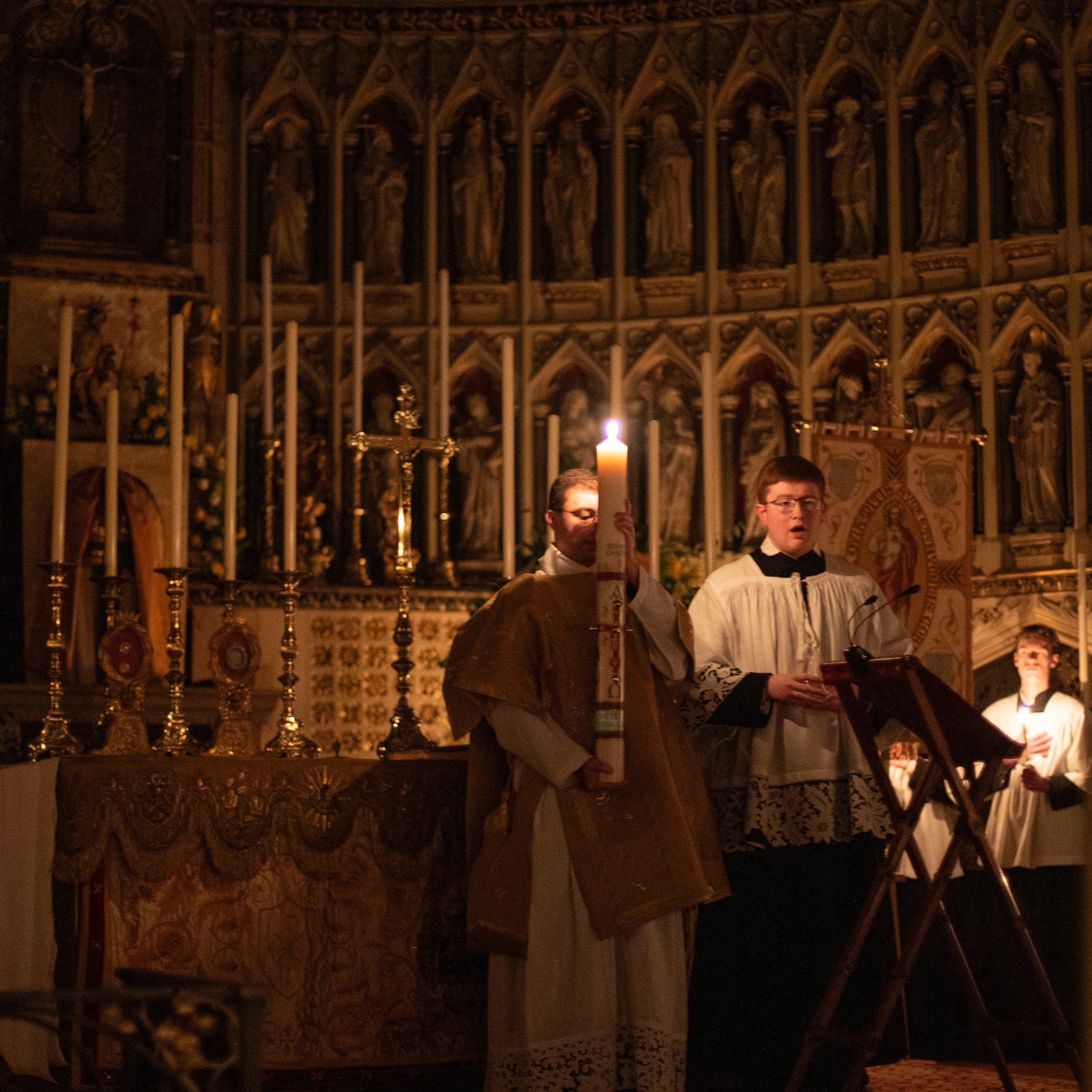
“Rejoice, let Mother Church also rejoice, arrayed with the lightning of his glory, let this holy building shake with joy, filled with the mighty voices of the peoples.”
#oxfordoratory
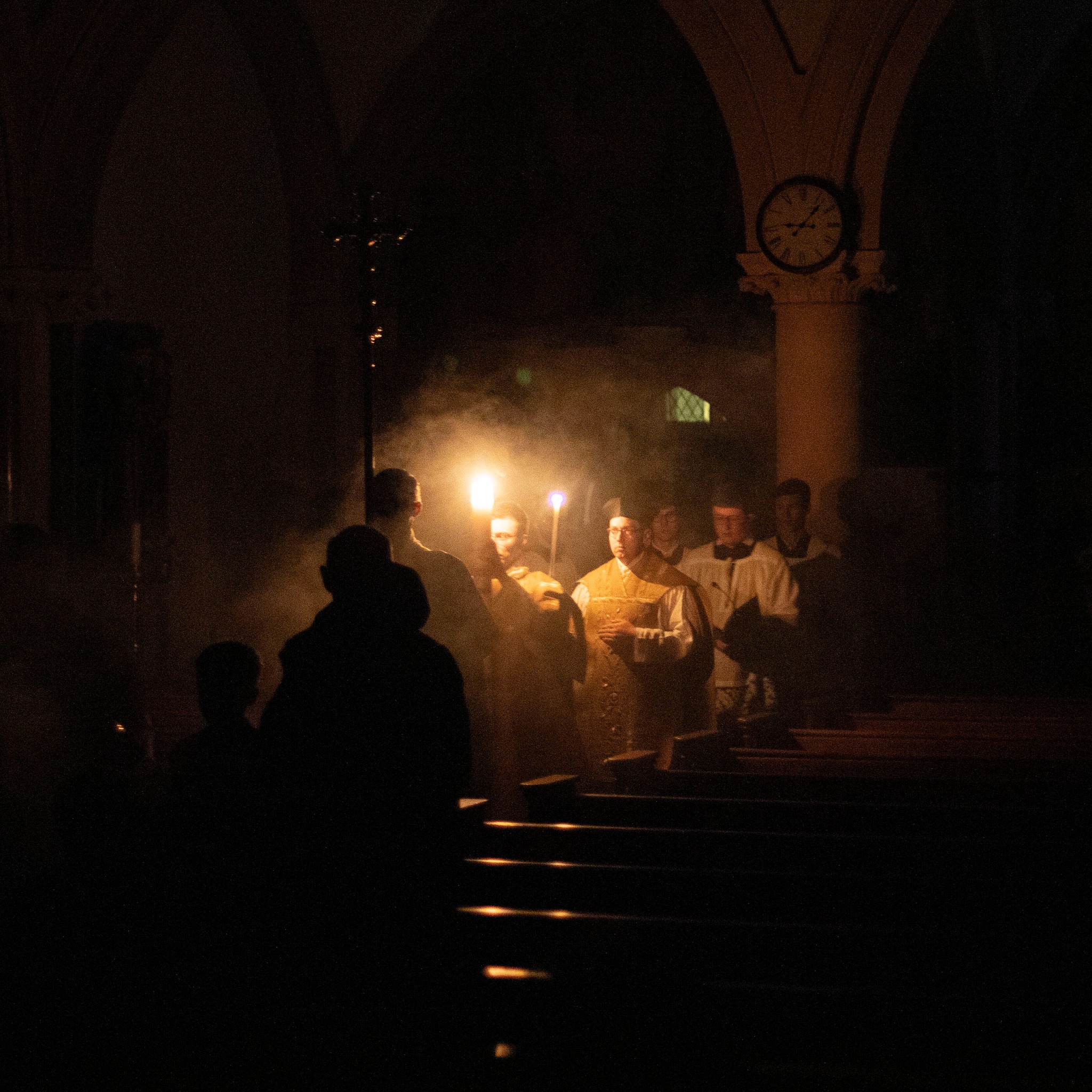
“Be glad, let earth be glad, as glory floods her, ablaze with light from her eternal King, let all corners of the earth be glad, knowing an end to gloom and darkness.”
#oxfordoratory


